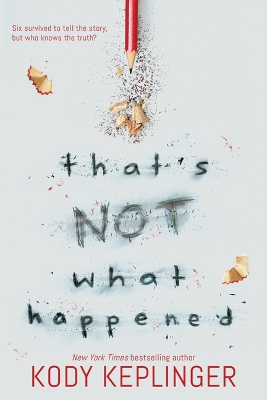
Jo
Written on Apr 11, 2019
Trigger Warnings: This book features a school shooting, blood, panic attacks, discussion of trauma, and alcoholism.
I've wanted to read That's Not What Happened by Kody Keplinger from the moment I first heard about it. But I should have picked it up much sooner, because it's absolutely bloody incredible.
It's been three years since the school shooting at Virgil County High School, and Leanne - known as Lee - is one of the six survivors. Lee's best friend Sarah died in the shooting, but shortly after the shooting, rumours started to spread about the final moments before Sarah died. That she died defending her faith, as the shooter mocked her over the ugly cross necklace and her faith. Except none of that happened. Lee was in the bathroom stall with Sarah, the both of them hiding. Sarah wasn't wearing a necklace. No words were exchanged with the shooter, he just killed her. But the rumours spread, and now everyone has this idea of who Sarah was, and they've painted her as a martyr. Her story means so much to so many people, but her story is wrong. Now Sarah's parents want to write a book about Sarah and how she defended her faith in her final moments, and Lee knows this isn't what Sarah would have wanted. It's time to put the story straight about what really happened that day. But Sarah isn't the only person the community have ideas about; they have impressions of who all six survivors are due to how they reacted that day. Lee wants them all to get together and put their stories out their, tell the truth of what really happened that day, and how no-one really understands what the survivors experienced.
That's Not What Happened is a long letter written by Lee several months after the third anniversary of the school shooting. This is her story; her story of what really happened, her story of coping with the trauma afterwards, and her story of how she tried to put things right. It's also the stories of all the other five survivors. After hearing about the McHales' - Sarah's parents - book, Lee knows she needs to put the record straight. She's tried so many times to tell people what really happened, but her own trauma and others' grief stopped her. But when the McHales, who are pretty much Lee's second family, respond with outrage to the "lies" Lee is telling them, she knows something more needs to be done. The camera crews will be pack. The shooting will be picked over. The pedestal Sarah has been put on will only get taller. And no matter what everyone thinks they know, they'll get everyone's stories wrong. Lee gets the idea that all the survivors - who, all but one, have formed a close bond of friendship because they're the only ones who really get it, the only ones who were really there - should write letters of their own experiences of that day, and how that day changed everything for them. These stories will counter-balance the story the McHales will write, and the truth will be out there.
This book is so, so powerful. It is highly emotional, and very thought provoking. It really emphasises that no-one knows what really happened that day to the individuals who survived it except those individuals. Even though they have a shared experience, not even fellow survivors really know what happened that day, and not just in regard to the actual events, but also in regard to how what happened affected them. Everyone knows there was the hero, the terrified blind boy, the girl who took what happened to campaign against gun crime, and so on. But this isn't the truth - or, at least, not the whole truth. Wires are crossed, or people misunderstand things, and then truth is "built" on top of that. But it's not real.
What's really interesting is how this book isn't about the shooting itself, it's about the people. Those who survived and those who didn't. Throughout Lee's letter, she shares the letters of the other survivors, but she also takes time to talk about each individual person who was killed. And if she didn't know them well enough, she'd ask one of the survivors who did know them to share who each person was. Because, again, people have ideas about those who were killed, but they're not always true. But also, it's about giving these people some respect; they're more than just a face, a name, a victim. They were people, people who lived and had lives and personalities. Who had flaws and made mistakes, or weren't necessarily the nicest of people - because who talks about someone's bad points when they've been murdered? But you can't hide who they really were - but who absolutely did not deserve to die. Every survivor and every victim is a real, fully formed person in this book. You get to know them all.
While we do get flashbacks of the shooting, as I said, it's not about the shooting. And because of this, the shooter is never named in this book. Not once. When the other survivors mention his name in a letter, Lee has removed it. Instead of, "When Bob appeared," it will say "when appeared". At first it felt like a mistake in the text, even though Lee had already said she wasn't going to name him, because he didn't deserve it, it felt like a word had accidentally been missed out. But I realised what was missed out was the name. Not "he", but his actual name. Lee has absolutely no interest in discuss the shooter, or his possible motivations or excuses. He doesn't deserve to be discussed, and there is absolutely no excuse. He doesn't matter anywhere near as much as those he killed and attempted to kill. I found this really interesting, and actually really powerful, the complete refusal to give him any kind of page-time.
I loved the characters, and the strong friendships that were formed between them, despite age gaps. They have all been changed by what happened, and while others may try so hard to understand and to be there for them, it's only other survivors who truly get it, and can truly help. They form such a tight nit group, and continue to be so even after some of them graduate and move away. Even three years on, they still need each other. And these friendships, some of which seem so unlikely, are just the most beautiful portrayals of friendship I have ever seen. I adored them all.
That's Not What Happened is absolutely incredible when it comes to the effects of surviving a school shooting. When we hear about them on the news, it's about about for a few days, and then everything moves on. These are the people who died, here's some interviews with those who survived, but now there is other news, and we no longer hear about them. But they're all deeply affected by what happened that day. Miles can't and won't talk about the shooting. Ashley was disabled by the shooting and is now in a wheelchair. Lee has anxiety, and possibly PTSD, and an unhealthy obsession with death; she really struggles not to think about how doing anything could get you killed, and she's terrified of dying. She can't handle being startled, or having people touch (i.e. hug) her without warning. She sees a therapist and takes medication, and she's a lot better than she was, but she's not ok. There is survivor's guilt, those who blame themselves, those who feel pressure to be someone they're not. They're all people - real, human people, and they're been affected, and have responded, in a very human way. It's something you just don't get from the news stories. This story is heartbreaking and emotional, and completely and utterly wonderful.
It's also an incredibly diverse story. Denny is Black, and has been blind since birth, and uses a guide dog. Eden is Latina and a lesbian. As mentioned, Ashley ends up in wheelchair after the shooting. Lee is asexual. Keplinger is herself legally blind, and also on the ace-spectrum, so this novel is #OwnVoices.
That's Not What Happened is such an incredibly important and unbelievably powerful story, and one I won't forget in a long time. It's a stark reminder that there are real people behind those school shooting survivor interviews, and that while we might think we know who they are, we don't. And we're never going to know what really happened to them, nor how it's truly affected them. They're not just survivors, but people - we need to remember they're people.

